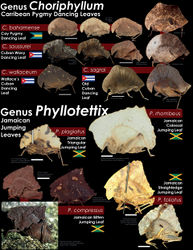Choriphyllum saussurei
| Notice: | This page is derived from the original publication listed below, whose author(s) should always be credited. Further contributors may edit and improve the content of this page and, consequently, need to be credited as well (see page history). Any assessment of factual correctness requires a careful review of the original article as well as of subsequent contributions.
If you are uncertain whether your planned contribution is correct or not, we suggest that you use the associated discussion page instead of editing the page directly. This page should be cited as follows (rationale):
Citation formats to copy and paste
BibTeX: @article{Skejo2023DeutscheEntomologischeZeitschrift70, RIS/ Endnote: TY - JOUR Wikipedia/ Citizendium: <ref name="Skejo2023Deutsche Entomologische Zeitschrift70">{{Citation See also the citation download page at the journal. |
Ordo: Orthoptera
Familia: Tetrigidae
Genus: Choriphyllum
Name
Choriphyllum saussurei Bolívar, 1887 – Wikispecies link – Pensoft Profile
- Choriphyllum saussurei Bolívar, 1887: 203–204 (original description, type locality Cuba, and holotype drawing); Bolívar 1888[1]: 146 (listed in the catalogue); Gundlach 1891[2]: 347 (new records and habitat observation, “He encontrado esta especie en la Isla de Pinos y en Trinidad, en la Montaña debajo de hojarasca.”). Taxonomic and nomenclatural history.
- Phyllonotus saussurei Bol.; Hancock 1902a[3]: 45–46 (included in the key, re-description provided).
- Choriphyllum saussurei Bolívar; Hancock 1907[4]: 13 (listed in the catalogue, redrawn after Bolívar 1887[5]); Kirby 1910[6]: 6 (listed in the catalogue); Paris. 1994[1993]: 248 (status of the syntypes); Yong and Perez-Gelabert 2014a[7]: 406 (listed in the checklist); Yong and Perez-Gelabert 2014b[8]: 131–132 (listed in the catalogue); Hollier 2016[9]: 27 (status of the syntypes in MHNG); Silva et al. 2019[10]: 3, 5, 6, 9 (information on syntypes, included in the key, photographs of the type specimens).
Type locality
Cuba, without a specified location (Bolívar 1887[5]; 1888[1]).
Type specimens
Syntype. ♀ Cuba • Gundlach leg.; MNHNC.; Syntypes. Cuba • 2♀ M. H. de Saussure leg. MHNG. Syntypes from the MHNG on the OSF, http://orthoptera.speciesfile.org/Common/basic/Taxa.aspx?TaxonNameID=1100632.
Other specimens
Cuba • 1 ♂; Sierra del Grillo; Apr 1969; P. Alayo leg.; IES.
Cuba • 1 ♀; Mayabeque Province, Jaruco Municipality, Escaleras de Jaruco; 9 Apr 1979; J. de la Cruz leg.; IES.
Cuba • 1 ♀; Isla de la Juventud Especial Municipality, Isla de Pinos, Punta del Este; 19 May 1974; L. F. de Armas leg.; IES.
Distribution
(Fig. 2). The Cuban Wavy Dancing Leaf inhabits Cuba (Trinidad, Sierra del Grillo and Escaleras de Jaruco) and Isla de Pinos (Gundlach 1891[2], this study) where it can be found mostly in the mountains, where it dwells in the leaf litter (Gundlach 1891[2]). This species is endemic from west-central Cuba.
Diagnosis
(Figs 1, 3).Choriphyllum saussurei can be differentiated from its congeners by: (1) the caudal tip of the pronotum which reaches the tips of the hind knees, but not beyond (reaches behind the hind knees in C. (sagrai)), (2) the shape of the caudal tip of the pronotum which is excised at an angle (excised vertically in C. bahamense) and (3) the low, concave, sharply sloped caudal margin of the crest with a strong undulation (in C. (sagrai) the crest is higher, convex and sharply sloped and, in C. bahamense, it is higher, concave and moderately sloped).
Measurements
See Table 1.
Taxon Treatment
- Skejo, J; Yong, S; Bogić, D; Kasalo, N; 2023: Caribbean pygmy jumping leaves (Tetrigidae, Cladonotinae, Choriphyllini) Deutsche Entomologische Zeitschrift, 70(1): 129-141. doi
Images
|
Other References
- ↑ 1.0 1.1 Bolívar I (1888) Enumération des Orthoptères de l’île de Cuba.Mémoires de la Société Zoologique de France1: 116–164.
- ↑ 2.0 2.1 2.2 Gundlach J (1891) Ortopteros.Contribución a la Entomología Cubaña2(4): 335–384.
- ↑ Hancock J (1902a) Tettigidae of North America. Chicago, 188 pp. http://www.biodiversitylibrary.org/item/25899
- ↑ Hancock J (1907) Orthoptera Fam. Acridiidae. Subfam. Tetriginae.Genera Insectorum48: 1–79.
- ↑ 5.0 5.1 Bolívar I (1887) Essai sur les Acridiens de la tribu des Tettigidae.Annales de la Société Entomologique de Belgique31: 175–313.
- ↑ Kirby W (1910) A Synonymic Catalogue of Orthoptera (OrthopteraSaltatoria, Locustidae vel Acridiidae).British Museum (Natural History), London, 674 pp.
- ↑ Yong S, Perez-Gelabert D (2014a) Grasshoppers, Crickets and Katydids (Insecta: Orthoptera) of Cuba: An annotated checklist.Zootaxa3827(4): 401–438. https://doi.org/10.11646/zootaxa.3827.4.1
- ↑ Yong S, Perez-Gelabert D (2014b) Orthoptera (Arthropoda: Insecta) depositados en la colección J. C. Gundlach, Instituto de Ecología y Sistemática, La Habana.Novitates Caribaea7(7): 126–142. https://doi.org/10.33800/nc.v0i7.72
- ↑ Hollier J (2016) The type specimens of Orthoptera (Insecta) species described by Ignacio Bolívar and deposited in the Muséum d’histoire naturelle de Genève.Revue suisse de Zoologi123(1): 21–33.
- ↑ Silva D, Cadena-Castañeda O, Pereira M, De Domenico F, Sperber C (2019) New tribes, overview and checklist of Neotropical Cladonotinae (Orthoptera: Caelifera: Tetrigidae).Insecta Mundi0723: 1–38.
- ↑ Serville A (1838) Histoire Naturelle des Insectes. Orthoptères.Librairie encylopédique de Roret, Paris, 776 pp.


![Figure 3. Annotated schematic pictorial key to genera and species of Choriphyllini. Specimens are not to scale; for size comparison see Fig. 1. The red line shows the position of the highest point of the pronotal crest. The blue arrow points to the anterior margin of the pronotum; the green arrow points to the posterior pronotal tip; and the purple arrow points to the caudal margin of the pronotal crest. Shown are silhouettes of the type specimens of each species. For C. sagrai, shown is the silhouette of Serville’s (1838)[11] drawing of the holotype. The capital sinus is marked in red and pointed out in grey.](https://species-id.net/o/thumb.php?f=Dez-70-129-g003.jpg&width=250)